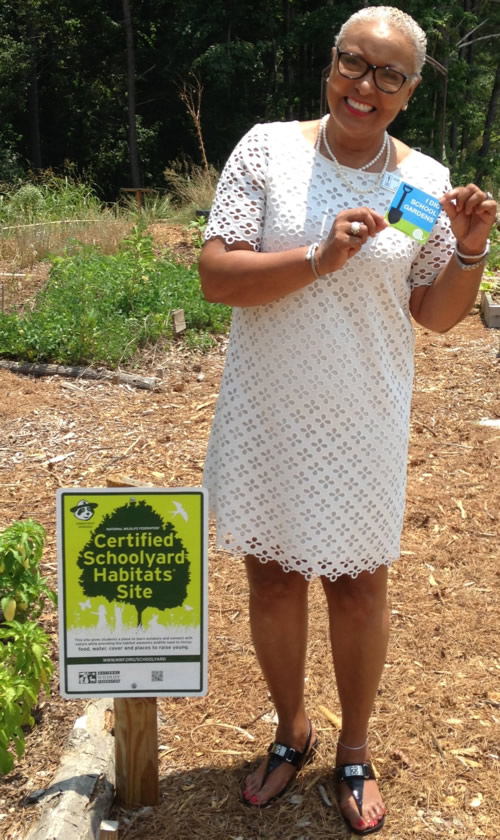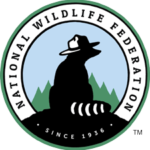By Tixie Fowler | The National Wildlife Federation (NWF) has recognized Summerour Middle School for creating a “Certified Wildlife Habitat.” The certification is part of NWF’s Garden for Wildlife program, which celebrates the efforts of schools, private residents and public spaces who take the initiative to provide garden space specifically for providing essential elements needed by all wildlife. The certification also makes the school site part of the Million Pollinator Garden Challenge, a national effort to restore critical habitat for pollinators like butterflies, birds, bees and other wildlife.

Summerour Principal Dorothy Parker-Jarrett in the school’s Learning Gardens area, where the NWF Wildlife Habitat Certification sign is proudly displayed.
Summerour Principal Dorothy Parker-Jarrett explains: “Teaching rigorous academics through the lens of environmental stewardship is a vital component of Summerour’s curriculum. It’s a context through which students learn as part of the school’s International Baccalaureate Middle Years Program.
“It’s exciting for our teachers because they see how learning in outdoor classrooms excites and engages the students. This NWF habitat certification also helps students realize they are part of a bigger vision, and instills pride that their school is part of a national effort. Feeling that connection to the larger community is another valuable part of their academic and social development.”
Summerour’s certification process included building a Butterfly Nursery that includes plants especially attractive to butterflies, including the endangered Monarch, as well as planting native flowers that entice pollinators throughout the garden. The habitat was developed by students, with the support of Summerour’s education team and Gardens4GrowingCommunity (G4GC), a locally founded nonprofit that is developing the gardens in Summerour’s Environmental Education Center as a pilot program for supporting outdoor education throughout Gwinnett County.
Summerour’s outdoor classrooms are designed to engage the whole community. The non-profit encourage people of all ages and backgrounds to share the excitement of harvesting their first carrot, or to plant seeds they remember growing in their home country. And being outdoors and connecting with the environment and wildlife helps students understand why they’re studying math, science and all the other academics – it becomes more meaningful, and more fun!
 Summerour’s gardens and wildlife habitat center are accessible to the public. The program encourages the community to take part in activities involving the 7,000+ square feet of natural and developed gardening space on the campus. It has grown into a demonstration site that offers ideas and resources for growing food, and explores the roles wildlife plays in sustaining a healthy community.
Summerour’s gardens and wildlife habitat center are accessible to the public. The program encourages the community to take part in activities involving the 7,000+ square feet of natural and developed gardening space on the campus. It has grown into a demonstration site that offers ideas and resources for growing food, and explores the roles wildlife plays in sustaining a healthy community.
David Mizejewski, an NWF naturalist, says: “We are so excited to have another wildlife garden. Over the last 40 years, nearly 200,000 wildlife gardeners have joined NWF’s Garden for Wildlife movement and helped restore wildlife habitats right in their own yards and neighborhoods. No matter whether you garden in a suburban yard, an apartment balcony or a 10-acre farm, a schoolyard or a business park, or anything in between, everyone can create a home for local wildlife. Turning your space into a Certified Wildlife Habitat makes a big difference for neighborhood wildlife.”
- For more information about creating a wildlife habitat, visit the NWF at www.nwf.org/news. For more information about Gardens4GrowingCommunity, the outdoor classrooms and environmental programming at Summerour Middle School, visit www.gardens4growingcommunity.com.









Follow Us